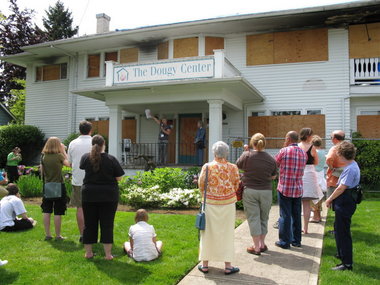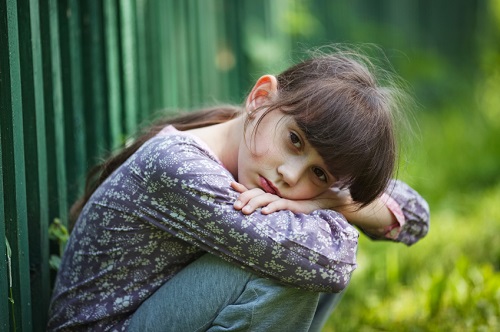For over 30 years, The Dougy Center in Portland, Oregon, has provided peer support groups for grieving children, teenagers, young adults, and their families. Today, the peer support program they pioneered has served as a model for at least 500 organizations worldwide. In this interview, Donna Schuurman, who recently left her role as Executive Director of The Dougy Center after 24 years, graciously shares her insight with SevenPonds.

The Dougy Center in Portland, OR
Aurora: Can you tell us a little about the history of the Dougy Center?
Donna: It was named after a boy named Doug who was dying of an inoperable brain tumor. The woman who founded the Dougy Center back in 1982, Beverly Chappell, was so impressed with how he would go around to other kids his age and generate discussions, asking things like,“Don’t you think it’s unfair we’ll never get to go to high school?” or “Have you ever kissed a girl?” Even though he was dying and knew he was dying, he was still living.
Beverly saw the power in kids simply being with other kids going through a similar experience. Her husband at the time (now deceased) was a pediatrician. He noticed that nobody really knew how to deal with kids in his care. So they started groups as a tribute to Dougy after he died. As far as we know, it was the first peer support group program in United States that put kids the same age together to talk about what they were going through.
Aurora: What services do you offer?
Donna: Our core services are grief support groups for children, age three up through young adults (and their adult family members), to be in a support group with kids their own age. Some kids come for six months, some come for six years — It’s up to them. We do training and interventions all over the world. I was recently in Japan, working with post-tsunami families and leading training sessions for professionals. Globally, there have been at least 500 programs based on our model; the ones we know of are listed on our website. We’ve trained about 300 of those 500 ourselves — We’ll be 30 years old next year!
Aurora: Congratulations! Could you share one or two of your most touching or inspiring experiences at the Dougy Center?
Donna: I’m inspired by every family that walks through our door!
One example: There was a family who came to the center with their son Ben, who was about nine at the time. His 12-year-old brother, Nathan, had been accidentally shot and killed by the police while he was being held hostage by a drug addict who broke into the family’s house as he ran from the police. Ben and his parents came to the center for about six years, participating in a group for families who had suffered a loss by homicide. They needed to be with people who had lived through a similar experience to heal. After six years, Ben became a volunteer. It’s incredible to watch him work with 3-5 year-old kids who just adore him.

Credit: radardaprimeirainfancia.org.
Aurora: In your observation, what are some of the ways death can impact a family?
Donna: It’s not unusual for every person in the family to respond just a little bit differently. That gets challenging because there’s no book you can buy that says this is how you do it.
I hear from a lot of kids, especially teenagers, who feel they had to grow up faster than their peers, assuming responsibilities other kids don’t have, sometimes becoming almost like parents to younger siblings. However, some of these kids observe that because of this, they possess maturity and sensitivity that many of their peers do not. At the Dougy Center, we get to see kids who transform tragic circumstances into creating meaning, fortitude, and caring about others. When we think, “I don’t know how I’m going to get through this,” and then we do, it strengthens us. We hear a lot about post-traumatic stress, but not about the post-traumatic growth that occurs with support, understanding, and appropriate methods of expression.
Aurora: Do you have any words of advice for someone helping children cope with grief?
Donna: Being honest is one key piece. I was at The Dougy Center for 24 years as director and five before that as a volunteer, and I’ve never heard a kid say, “I’m glad I was lied to.” But I have heard a lot of kids say that they were angry that they weren’t trusted with the truth. Honesty, even if it’s painful, is important.
Grief is an important part of loss and there’s no formula for it. What kids are looking for are opportunities to express what they’re going through in a society that tends to say, “You need to get over this.”
Aurora: And what advice would you have for grieving teenagers or young adults reading this blog?
Donna: You have a right to feel what you feel, and a right to find ways to express that, as long as they don’t hurt you or other people. And it takes time to do that. You might not feel like you have permission to grieve from the adults around you. Adults don’t always set the best example. Don’t get mad — instead, try to educate them.
Aurora: Thank you so much, Donna!

 What is the Dougy Center? An Interview with Donna Schuurman
What is the Dougy Center? An Interview with Donna Schuurman


 “As Tears Go By” by Marianne Faithfull
“As Tears Go By” by Marianne Faithfull
 “The Sea” by John Banville
“The Sea” by John Banville
 Funeral Favors Offer Visitors a Tangible Memento
Funeral Favors Offer Visitors a Tangible Memento















